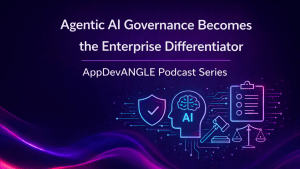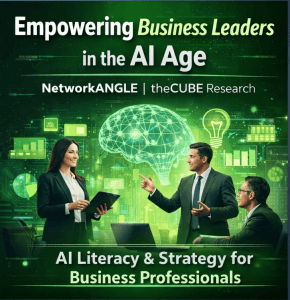Artificial intelligence (AI) is all the vogue now. So it wasn’t a huge surprise that Infor, a leading enterprise resource planning (ERP) solution provider, has announced a significant commitment to the technology, in the form of an initiative it calls “Coleman.” If you’re at Inforum 2017 this week in New York, you know that Coleman is far and away the primary topic of discussion.
Infor had to get serious about AI, if for no other reason than that fact that each of its chief ERP rivals–Microsoft, SAP, and Oracle–has recently doubled-down on their respective AI strategies. But we shouldn’t dismiss Infor’s AI commitment as a defensive strategy. It’s also not a me-too offering. Nor is it an attempt by Infor to grab a piece of AI’s current hipness quotient.
Instead, we should regard Coleman as a milestone in the ERP market’s ongoing evolution toward thoroughly AI-first solution architectures. As discussed at this week’s event, Coleman is a comprehensive framework within which Infor is re-architecting its ERP offerings away from an intricate thicket of declarative business rules toward an architecture in which the underlying logic is adaptive, contextual, personalized, and outcome-focused.
As Infor CEO Charles Phillips stated, “Infor spent many years automating processes that followed clear rules, such as accounting and manufacturing processes. We are now leveraging machine learning and our access to large amounts of data to assist users with less structured processes such as complex decisions, conversations, and predictions.”
That’s a powerful vision. Within this strategy, Coleman’s machine learning and other AI smarts will eventually infuse and thereby optimize every ERP interaction, transaction, and touchpoint enabled through the firm’s CloudSuite portfolio. In addition to embedding Coleman in the underlying CloudSuite platform, Infor plans to introduce it into CloudSuite’s diverse verticalized application suites in the coming year.
Typically, users will encounter Coleman AI in the form of conversational digital assistants that use natural language processing and image recognition. Infor refers to this as a “human augmentation” use of its AI that will boost ERP customers’ productivity. Coleman-enabled AI digital assistants will support a full range of data-driven decision-support queries, including descriptive (e.g., “Coleman, what is the aggregate accounts receivable balance?”), predictive (e.g, “Coleman, when are we likely to run out of cash if we don’t accelerate receivables collections?”), and prescriptive (e.g., “Coleman, what collections tactics should we implement now that are most likely to yield enough cash in the next 30 days for us to avoid insolvency?”).
However, many of Coleman’s capabilities will operate below the application surface, automating and continually optimizing data-driven transactions such as inventory management, transportation routing, predictive maintenance, and outbound customer communications. Data from Infor CloudSuite will continually drive all of these AI-enabled capabilities, as will supplier, logistics, and finance data from the GT Nexus Commerce Network. The vendor has also discussed plans to infuse more sensor-driven industrial Internet of Things applications with Coleman AI. And it has reaffirmed its commitment to using AWS as its core cloud data partner for all of these capabilities.
Clearly, Infor’s product teams have a lot of work ahead of them. Nevertheless, the vendor has already taken a bold first step in this direction. They have announced that Coleman technology is already in some commercial cloud offerings for predictive inventory management for healthcare, price optimization management for hospitality, and forecasting, assortment planning, and promotion management for retail. Just as important, Infor has a multibillion-dollar recent capital infusion from Koch Industries to fund this and other aggressive product initiatives going forward. Furthermore, Infor has fresh analytics talent from its just-completed acquisition of Birst, a cloud-native business intelligence vendor that brings its own AI technology into Infor’s AI-first cloud application strategy.
What’s missing from Infor’s AI strategy? Wikibon would like to see them clarify the following open issues:
- When will Infor’s entire CloudSuite portfolio, including the Networked CloudSuites supply-chain apps also announced today, be fully Coleman-enabled?
- When, if ever, will Coleman AI be available as embedded features of Infor’s premises-based software packages?
- Will Infor implement different Coleman AI features in different vertical market apps?
- How, if ever, will Infor incorporate Birst’s AI technology into Coleman?
- What APIs and tools will Infor provide to partners to enable them to embed Coleman AI features into their products?
- Will Infor do all Coleman AI research and development in-house, or will it license technology from established partners—especially AWS—that already have significant AI intellectual property?
- Will Infor use AWS’ Mechanical Turk crowdsourcing environment to manage the ongoing labeling of Coleman AI algorithmic-training data?
Going forward, Wikibon will be sounding out Infor for answers to these and other aspects of their evolving strategy of using AI in cloud ERP. As we’ve stated, Infor has pushed up the bar for ERP vendors seeking to transform their offerings into agile decision-support platforms for diverse business scenarios. We fully expect that Infor’s competitors will respond aggressively with innovative AI-enabled offerings of their own.
Catch the replays of Inforum 2017 Cube interviews with Infor execs Charles Phillips, Duncan Angove, Stephan Scholl, Pam Murphy, Chip Coyle, Martine Cadet, Marc Scibelli, and Corey Tollefson. And here’s our open on Wednesday morning where I discuss the analysis that I poured into this Inforum 2017 trip report/blog.


